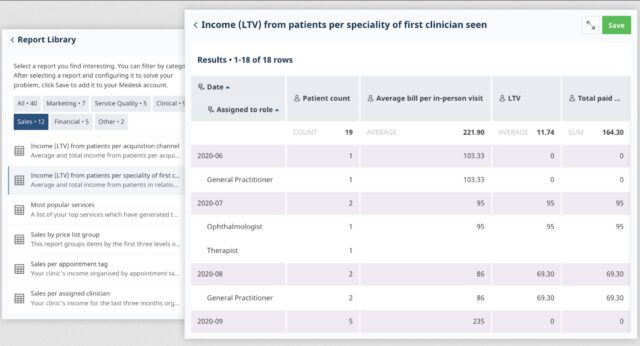
You have probably heard it said that people are the heart of any organization. It couldn’t be more true for the medical sector, which relies heavily on doctors and administrative staff when it comes to communicating with patients and delivering healthcare.
But how do we keep our staff motivated to ensure they stay with us, work hard, and provide top-level service to all who visit the practice? We have a few actionable tips that will help you keep your employees happy and boost job satisfaction.
Design workflows and best practices

When it comes to motivating employees, businesses often focus on what needs to be added and given to their team. However, a lot of the time, it takes removing something to raise morale and motivation. Obsolete workflows, the burden of paperwork, and confusing guidelines can do severe damage.
Depending on where your medical practice is in terms of streamlining your business processes, you might need the support of representatives of different departments to observe, record, and structure the most common workflows that happen in your clinic regularly. Once that’s done, gather feedback from as many employees as you can and work on removing anything that hinders you rather than helps.
Run regular all-staff meetings
If you are not running regular meetings with your employees, you are missing out on potential insights and ideas and risk turning little inconveniences into big problems. What’s more, you’ll make people feel like they are not important to you.
In any situation, and especially in times like these, don’t forget to schedule meetings and make them convenient for your team to attend. Share the agenda in advance, ask people for their contributions, and encourage everyone to speak up. Make sure you listen to all feedback, make a note of it, and follow it up later.
Schedule individual performance reviews
Many businesses carry out annual performance reviews to look at each team member’s performance, share feedback, and plan for the following year. These meetings can be intimidating if your employees feel like they are only being judged and picked apart.
According to Medesk you can track performance indicators in a dedicated analytics module as part of your private practice management software. In doing so, you don’t really need to wait a whole year to review your progress. It’s easy to take a monthly or even weekly look at how things are going and make adjustments before problems get out of hand.
Amongst other analytics, practice management software helps you to tackle issues related to:
- Cancellations and no-shows linked to specific practitioners
- Profitability of individual services and doctors in different specialties
- Patient acquisition costs and retention rates
- Payment schemes and incentives
- Workload distribution and popularity of your services
Just as with your usual meetings, let your team prepare for performance reviews in advance. You might even share some of your feedback with them prior to the meeting, letting them review it at their own pace and share their thoughts with you during the review. Don’t forget to ask the staff to share their experience of working at the practice. What do they like, and what could be improved? How do they feel about your management style? This way, you will show them that they are an important part of your business, and you will gain invaluable insights from their feedback.
Lastly, speak to your employees about their goals and aspirations. What would they like to do? Are there any projects they would love to take part in or maybe even lead? There’s only so much you can do if people are not excited about their current responsibilities.
Acknowledge progress, remember to say ‘thank you and celebrate the little wins

This might sound like an obvious thing to do. Still, it’s human nature to take all good things for granted and pay more attention to what’s not perfect. Managers are human too, and they fall into that trap as well. Try focusing more on the successes, however small they might seem to you. Your team will appreciate that little message on group chat or a quick word during the meeting complimenting someone’s achievement.
In times of crisis, you might also celebrate not failing too much. Let’s say you had a goal to grow your turnover and patient count by 20% last year, but then the pandemic hit. If your final result of 2024 was maintaining the 2019 level, or your turnover fell but by 10% only, — celebrate that! After all, everything is relative.
Watch out for burnout and encourage task delegation
There are many reasons why people burn out. If you run regular 1-on-1 meetings with your colleagues, you will be able to catch signs of burnout associated with job dissatisfaction. Then there is the burnout that happens when people are overburdened with work. As tempting as it might be to leave your overly invested employees working extra hours and skipping breaks, don’t fall for it. If people burn out, they make mistakes and eventually leave. In the medical sector, the last thing you need are errors that can affect people’s health and well-being.
You can run a brainstorming session or chat with your team and see which tasks can be ignored, automated, and delegated, ultimately improving your clinic’s workforce with the help of chghealthcare.com. Delegating is a great way to test and see if teammates are ready for new responsibilities and test the water for potential promotions. It also shows the trust among the team.
Good practice management helps to reduce clinician burnout by facilitating:
- Delegation of tasks between admin and clinical teams for a better patient experience
- Access to direct links to relevant appointments and patient records
- See a breakdown of tasks due associated with scheduled appointments
- View outstanding tasks in every patient record
- Filter tasks according to type, assigner, and the due date for prioritization
Invest in equipment, technology, and training
There are many ways you can show you care about your employees and your medical practice. One of them is regularly investing in updates and upgrades to your medical software, equipment, and your employees. Outdated knowledge and technology cause delays, errors, and general frustration.
Work on building a team environment

Your team members do not need to be best friends, but they will definitely work better if they feel like they are all pulling in the same direction. Try sponsoring get-togethers at least once a quarter to make sure your employees spend some time together outside the workplace. Track birthdays and other important events, such as weddings, and remember to show that you care. Encourage your team to get involved when new staff joins and are just learning the ropes. You want everybody to feel comfortable around each other.
As the coronavirus pandemic continues, you might need to opt for online or outdoor gatherings to make sure everyone stays safe and complies with the rules, but do not skip team-building activities altogether. It’s in times like these that people need that extra boost to help them get through the day.
We hope that the tips we talked about today will give you a few ideas about motivating your team. There is one bonus tip that we would like to share: be flexible. Over the course of the last year, many households have had to deal with a lower income, experienced the loss of family members, and have had to homeschool their children. You will stand out as an employer if you allow for additional flexibility in shifts, breaks, and time off. Good clinic management software will make it easy to rearrange rotas quickly. Although keeping your business running is, of course, a priority but show a little compassion when your employees are struggling. This simple act will give you their loyalty and trust, which ultimately benefits you in the long run.
Don’t know where to start? Get in touch with us to find out how our practice management software can help you to create a healthy, transparent, and dynamic culture in your clinic.













